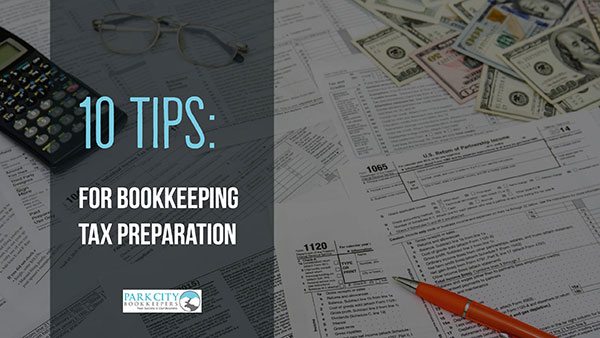One area where business owners may struggle is tax preparation. Calculating taxes accurately and paying them on time will help your business avoid tax penalties and issues with IRS audits. In this article, we will provide some simple but useful bookkeeping tax preparation tips that will help you get everything in order come tax season.
#1. Start early
Do not leave your tax preparation to the last minute. Not only will this help you avoid additional stress, starting early will allow you to identify any mistakes, give you plenty of time to correct said issues, and prepare the required documents ahead of time. Most businesses run into tax preparation issues because their books are a mess and documents are not filed properly.
#2. Make a checklist
Tax preparation requires the use of several documents, and the details can be overwhelming. To make sure that you cover everything, make a bookkeeping tax preparation checklist of everything you need and ensure that you have everything all well ahead of time. Some of the key documents include:
- Bank Statements
- Payroll information
- Income statements
- Past tax receipts
- Expense receipts
- Depreciation schedules
#3. Store receipts and expense information digitally
If you have been shoe-boxing your receipts, it is recommended that you create digital copies as soon as possible. Whether you are using a bookkeeping software or manually scanning them and recording them, do not skip this step. This is an important bookkeeping tax preparation tip, because you will need to furnish all receipts and copies, and going over them manually will waste a lot of time.
Digitally stored receipts are easily searchable, stored securely, and you can print as many copies as required when the time for filing comes.
#4. Categorize all expenses
Once you have digitized your expense receipts and documents, a good idea is to group them according to their broad categories. For instance, office supplies can be one category and client lunch or dinner meetings can be another.
Since a lot of different expense types are eligible for tax deductions, grouping them together will make it much easier to calculate and claim these deductions.
#5. Gather records of charitable donations
Charitable donations are also deductible, so if you have made any substantial donations, you will need to file them, along with the relevant evidence. If the donation was for an amount of $250 or more, you will need to have some form of an acknowledgment letter from the charity, stating that the donation was received and nothing of monetary value was given in exchange.
#6. Do your research and review required forms
Tax laws and regulations vary for different types of business entities and are also subject to change. A good way to get ahead of the process is to conduct research, collect the relevant forms and go over them.
For instance, if a business is a sole proprietorship, all revenues and losses are reported in the owner’s personal income tax returns. For that you will need a Schedule C filed with a Form 1040.
Corporations, use a Form 1120, S Corporations need a Form 1120S and Partnerships use a Form 1065.
#7. Compare with previous filings
Comparing your current tax position with previous tax filings is a good way to cross-check your work and a key bookkeeping tax preparation tip. Unless there have been any significant changes in your business and income over the past year, your taxes should look comparable. If you notice any irregularities, you should be able to pinpoint the reasons and rectify any mistakes.
#8. Ensure that you comply with the period of limitations for tax records
The IRS has a list of instructions requiring businesses to maintain their records for tax purposes. While you can get the full list on the IRS website, here’s a summary:
- Keep records for 3 years from the date of filing or 2 years from when the tax was actually paid
- If no return has been filed as yet, you need to have all records from the start of your business
- If a fraudulent return was filed earlier, you will need to keep your records indefinitely (we do not recommend doing this)
- If in the past you did not report your income properly, you will need to keep records for 6 years
- Employment tax records are to be kept for at least 4 years
#9. Consider filing an extension
As tax day approaches you may find yourself unprepared. If this is the case, you do not have to go ahead with your filing on April 15. Instead, you can request an extension and get another 6 months to prepare and file your returns.
However, in the case of an extension, you will still need to make a tax payment according to your estimation of what you owe. It may be better to request an extension than filing ill-prepared returns and incurring penalties.
#10. Hire a tax professional
Tax preparation is not for everyone, and if you find yourself struggling to put it all together, or dread dealing with the figures so much that you keep procrastinating, then you might want to consider hiring a professional tax preparer who will help you get everything done.
Statistics from the federal government show that about 60% of people use a tax preparer to help them file their taxes, and this is a viable option, if you want to skip over all the research and have a professional takeover. Whether you decide to do your taxes yourself, or hire a tax preparer, in either case, these 10 bookkeeping tax preparation tips should make the process easier and help you get ready for filing.

